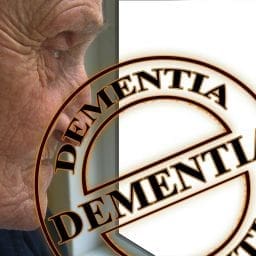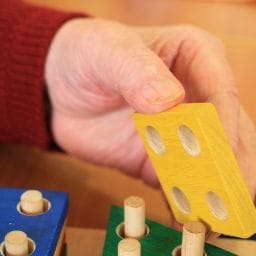
Contact Us
What are the Symptoms of Frontotemporal Dementia?
Frontotemporal dementia (FTD) is a disorder that primarily affects the frontal and temporal lobes of the brain, areas generally associated with personality, behaviour, and language.
Unlike other forms of dementia, such as Alzheimer’s disease, FTD often presents with symptoms related to behaviour and language rather than memory loss, making it a challenging condition to identify and diagnose. Understanding the symptoms of FTD is crucial for early diagnosis and management, which can significantly impact the quality of life for those affected and their caregivers.
Understanding Frontotemporal Dementia
FTD is caused by the progressive degeneration of the frontal and temporal lobes of the brain. This degeneration leads to a variety of symptoms that are broadly categorised into three main types: behavioural variant FTD, primary progressive aphasia, and movement disorders. Each type affects individuals differently, and symptoms can overlap, making FTD a complex condition to understand and manage.


Behavioural Variant Frontotemporal Dementia (FTD)
Behavioural variant FTD is the most common form of FTD and primarily affects personality and behaviour. Symptoms often include:
🧠 Personality changes: Individuals may become socially inappropriate, impulsive, or indifferent to the feelings of others. These changes can manifest as a loss of empathy, reduced sensitivity to social cues, and inappropriate behaviour in social situations.
😔 Apathy and withdrawal: A marked lack of interest or motivation in activities once enjoyed is common. Individuals may also show a lack of initiative in daily life.
🔁 Compulsive behaviours: Repetitive or ritualistic behaviours, such as compulsive eating, collecting items, or repeating words or phrases, may develop.
⚖️ Lack of insight and judgment: Individuals often lack awareness of their behaviour changes and may exhibit poor decision-making skills.
These symptoms can lead to significant challenges in personal relationships and the ability to function independently, making early intervention and support crucial.
If you are concerned that a family member or friend is showing unusual actions or behaviours, then please read our blog post on the 7 Key Stages of Dementia. This guide has been produced by our expert care team at 1st Focus Homecare and explains clearly what to look for at each potential stage of cognitive decline.
If you feel that 1st Focus Homecare is a company you can trust, please contact our office on 0131 510 7878, where we can discuss your care needs. If we can help you or your loved one, we can arrange to meet you in person at your home to assess your care needs. Once an agreement is in place with you privately or via the local council, we will build you a care and support plan and agree on a start date.
Primary Progressive Aphasia (PPA)
Primary progressive aphasia is a form of FTD that predominantly affects language skills. It is further divided into three subtypes: semantic variant, nonfluent/agrammatic variant, and logopenic variant. Common symptoms include:
📚 Semantic variant: Characterised by a loss of word meaning, individuals may have difficulty understanding language and recognising familiar objects or faces. They might speak fluently, but with less meaning.
🗣️ Nonfluent/agrammatic variant: Individuals experience difficulties with speech production, including hesitant or grammatically incorrect speech. They may also struggle with complex sentence structures.
🔍 Logopenic variant: Marked by difficulty finding words and constructing sentences, individuals often speak slowly and pause frequently to search for words.
As PPA progresses, individuals may find it increasingly challenging to communicate, impacting daily interactions and quality of life.
Movement Disorders Associated with FTD
Some people with FTD develop movement disorders that resemble those seen in Parkinson’s disease or amyotrophic lateral sclerosis (ALS). These symptoms may include:
💪 Muscle weakness and stiffness: Difficulty in moving limbs or maintaining balance.
🤲 Tremors or involuntary movements: Similar to those seen in Parkinson’s disease.
🎯 Coordination problems: Challenges with tasks requiring precise movements, such as buttoning a shirt or writing.
These symptoms can significantly affect mobility and independence, necessitating adaptations in daily life and care.


Diagnosis and Management
Diagnosing FTD involves a comprehensive assessment, including:
- 📝 Medical history and physical examination: To identify symptoms and rule out other conditions.
- 🧠 Cognitive and language tests: To evaluate specific deficits in behaviour and language.
- 🖥️ Brain imaging: MRI or CT scans can reveal changes in the frontal and temporal lobes.
- 🧬 Genetic testing: In some cases, particularly where there is a family history, genetic tests may be recommended.
There is currently no cure for FTD, but several strategies can help manage symptoms:
💊 Medications: Antidepressants or antipsychotic medications may help manage behavioural symptoms, though their use should be closely monitored.
🗣️ Speech and occupational therapy: These can help individuals maintain communication skills and independence in daily activities.
🤝 Support groups and counselling: Providing emotional support for both individuals and their caregivers.
Conclusion
Frontotemporal dementia is a complex condition with a wide range of symptoms primarily affecting behaviour, language, and movement. Understanding these symptoms is crucial for early diagnosis and management, which can help individuals and their families navigate the challenges posed by FTD. Continued research and awareness are essential in improving understanding and treatment options, offering hope for better management and support for those affected by this challenging condition.
Support Resources
📄 Dementia Care Pages & Posts
- Alzheimer’s Elderly Care in Edinburgh
- Building a Music Playlist for Dementia Sufferers
- How Can You Help a Person With Dementia? Essential Strategies and Tips
- The Benefits of Home Care Services for Individuals with Dementia
- Understanding the 7 Stages of Dementia
- What are the Symptoms of Frontotemporal Dementia?
- What is Alzheimer’s Disease, and is it Treatable?
- What is DLB? – Dementia with Lewy Bodies
- What is Mixed Dementia and How is it Treated?
- What is Vascular Dementia, and What are its Causes?
- What is Young-onset Dementia and How is it Managed?
- Early Dementia Detection at Home: Signs & Tools
- Challenging Behaviour – A Guide for Carers
FAQs About Frontotemporal Dementia (FTD)
What is frontotemporal dementia?
Frontotemporal dementia (FTD) is a type of dementia that primarily affects the frontal and temporal lobes of the brain, causing changes in personality, behaviour, and language.
What are common symptoms of FTD?
Common symptoms include personality changes, inappropriate social behaviour, language difficulties, lack of empathy, and difficulty planning or making decisions.
How does FTD differ from Alzheimer’s disease?
FTD usually affects younger people (typically under 65) and presents with behavioural and language problems first, while Alzheimer’s typically begins with memory loss in older adults.
What are the different types of FTD?
There are three main types: behavioural variant FTD (bvFTD), semantic variant primary progressive aphasia (svPPA), and non-fluent variant primary progressive aphasia (nfvPPA).
What causes frontotemporal dementia?
FTD is caused by abnormal protein buildups in the brain, such as tau or TDP-43, which damage brain cells in the frontal and temporal lobes. Genetics can also play a role.
Is there a cure for FTD?
There is currently no cure for frontotemporal dementia. Treatment focuses on managing symptoms and improving quality of life through medication, therapy, and support.
How is FTD diagnosed?
Diagnosis involves neurological exams, brain imaging (MRI or CT scans), cognitive tests, and often referrals to a specialist in cognitive disorders.
Can medication help people with FTD?
While there are no drugs specifically for FTD, medications such as antidepressants or antipsychotics may be used to help control symptoms like agitation or depression.
Can speech or occupational therapy help?
Yes, speech and occupational therapy can help people with language or movement issues improve daily function and maintain independence for longer.
How can families support a loved one with FTD?
Families can provide structured routines, patient communication, and emotional support. Joining support groups and using respite care services can also ease the burden on caregivers.

1st Focus Homecare Newsletter
Join our newsletter to keep up to date with all the news related to elderly care in Edinburgh. Our newsletter is sent out weekly and contains news and tips on healthy living and healthy eating for the elderly.
We have a great library of posts that are shared on our news page with helpful tips for individuals and families who are looking for homecare in Edinburgh.

















